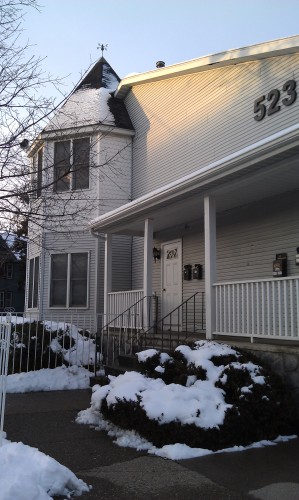
During these tough economic times, both local and national newspapers are finding ways to save money in order to keep publishing.
For the Capital Region’s alternative newsweekly, Metroland, this meant parting from their central city location last August and transferring to a new, but smaller office in the Pine Hills neighborhood.
“I mean roughly, we are in half the space, so to say that we are paying half the rent and utilities is not too far from accurate,” said Stephen Leon, active owner and publisher.
The decision to move from the 5,700-square-foot building near Lark Street to the 2,700-square-foot office space on 523 Western Ave. was also a matter of practicality.
The commercial property on Madison Avenue was meant for a much bigger staff than the 17 employees who currently work at the paper.
“Well, like all print media we are smaller,” said Shawn Stone, arts editor for Metroland. “There were seven people on the editorial staff and now there are three. We didn’t need as much space.”
Prior to the move, Metroland leased the property in the city square neighborhood from Terra Stratton, owner of The Chocolate Gecko on Colvin Avenue.
Leon recalled that the alternative weekly newspaper had 24 employees at its peak in 2004. When he signed the lease for 419 Madison Ave. he planned on expanding to 27.
Instead of growing like he had hoped, the paper’s staffing plans headed in the opposite direction as a result of the recession. The staff size shrunk over the last eight years and new positions were never filled.
Leon’s decision to move did not shock Stratton, who was well aware the space became too large and costly for the alternative paper.
“It was a luxury, not a necessity,” said Stratton.
Metroland’s new headquarters on Western Avenue do not possess the same charming qualities as the old workplace, such as the half mooned windows, red brick exterior and hip location. However, Leon made sure that the Pine Hills provided similar amenities to the city center like public transportation, restaurants, and grocery stores.
“One thing that is exactly the same for me is that my desk and my office are still 10 yards from a bus stop. All day long I am hearing that voice ‘next stop Allen and Western or whatever’,” said Leon.
Besides the occasional echo from the CDTA, both Stone and Leon noticed the neighborhood is much quieter and less active than their previous one.
The paper has moved several times since Peter Iselin founded it in 1978. Five times since Leon began working there in the 80’s.
Getting accustomed to the latest environment has had no effect on the business itself. It continues to circulate 38,000 papers across seven regional counties and still has a loyal advertising clientele.
The Daily Grind, a café and coffee parlor on Lark Street has been advertising with Metroland since the 1980’s. The owner, Lee Cohen, was unaware of its relocation, but doesn’t mind as long as the paper’s quality remains the same.
“The physical location matters little these days, before they were there, they were on Central Avenue,” said Cohen. “What’s more important to me, is a location of a business next to my business.”
Another long-time advertiser and owner of Bombers Burrito Bar on Lark Street, Matt Baumgartner, did not know the paper moved uptown either. Like Cohen, he doesn’t see why the move matters to him or any of the advertisers, as long as the paper stays true to its roots.
“Metroland readers are our customers – liberal, urban-y, center square-y,” said Baumgartner.
For now, the paper plans on staying put for the next 2 ½ years, which is when Leon said their lease is over.
As for 419 Madison Ave., a renovation is underway.
Stratton’s property is currently being flipped into a six unit apartment building in order to optimize the commercial estate.
The new apartment complex should hold its first open house this fall.
“We are guessing $1,300 a month including utilities,” said Stratton. “It will be historically preserved with cool technology.”

